(CNN)In hundreds of highly classified phone calls with foreign heads of state, President Donald Trump was so consistently unprepared for discussion of serious issues, so often outplayed in his conversations with powerful leaders like Russian President Vladimir Putin and Turkish President Recep Erdogan, and so abusive to leaders of America's principal allies, that the calls helped convince some senior US officials -- including his former secretaries of state and defense, two national security advisers and his longest-serving chief of staff -- that the President himself posed a danger to the national security of the United States, according to White House and intelligence officials intimately familiar with the contents of the conversations.
The calls caused former top Trump deputies -- including national security advisers H.R. McMaster and John Bolton, Defense Secretary James Mattis, Secretary of State Rex Tillerson, and White House chief of staff John Kelly, as well as intelligence officials -- to conclude that the President was often "delusional," as two sources put it, in his dealings with foreign leaders. The sources said there was little evidence that the President became more skillful or competent in his telephone conversations with most heads of state over time. Rather, he continued to believe that he could either charm, jawbone or bully almost any foreign leader into capitulating to his will, and often pursued goals more attuned to his own agenda than what many of his senior advisers considered the national interest.
These officials' concerns about the calls, and particularly Trump's deference to Putin, take on new resonance with reports the President may have learned in March that Russia had offered the Taliban bounties to kill US troops in Afghanistan -- and yet took no action. CNN's sources said there were calls between Putin and Trump about Trump's desire to end the American military presence in Afghanistan but they mentioned no discussion of the supposed Taliban bounties.
By far the greatest number of Trump's telephone discussions with an individual head of state were with Erdogan, who sometimes phoned the White House at least twice a week and was put through directly to the President on standing orders from Trump, according to the sources. Meanwhile, the President regularly bullied and demeaned the leaders of America's principal allies, especially two women: telling Prime Minister Theresa May of the United Kingdom she was weak and lacked courage; and telling German Chancellor Angela Merkel that she was "stupid."
Trump incessantly boasted to his fellow heads of state, including Saudi Arabia's autocratic royal heir Mohammed bin Salman and North Korean dictator Kim Jong Un, about his own wealth, genius, "great" accomplishments as President, and the "idiocy" of his Oval Office predecessors, according to the sources.
In his conversations with both Putin and Erdogan, Trump took special delight in trashing former Presidents George W. Bush and Barack Obama and suggested that dealing directly with him -- Trump -- would be far more fruitful than during previous administrations. "They didn't know BS," he said of Bush and Obama -- one of several derisive tropes the sources said he favored when discussing his predecessors with the Turkish and Russian leaders.
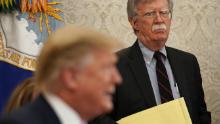
The full, detailed picture drawn by CNN's sources of Trump's phone calls with foreign leaders is consistent with the basic tenor and some substantive elements of a limited number of calls described by former national security adviser John Bolton in his book, "The Room Where It Happened." But the calls described to CNN cover a far longer period than Bolton's tenure, are much more comprehensive — and seemingly more damning -- in their sweep.
Like Bolton, CNN's sources said that the President seemed to continually conflate his own personal interests -- especially for purposes of re-election and revenge against perceived critics and political enemies -- with the national interest.
To protect the anonymity of those describing the calls for this report, CNN will not reveal their job titles nor quote them at length directly. More than a dozen officials either listened to the President's phone calls in real time or were provided detailed summaries and rough-text recording printouts of the calls soon after their completion, CNN's sources said. The sources were interviewed by CNN repeatedly over a four-month period extending into June.
The sources did cite some instances in which they said Trump acted responsibly and in the national interest during telephone discussions with some foreign leaders. CNN reached out to Kelly, McMaster and Tillerson for comment and received no response as of Monday afternoon. Mattis did not comment.
The White House had not responded to a request for comment as of Monday afternoon.
One person familiar with almost all the conversations with the leaders of Russia, Turkey, Canada, Australia and western Europe described the calls cumulatively as 'abominations' so grievous to US national security interests that if members of Congress heard from witnesses to the actual conversations or read the texts and contemporaneous notes, even many senior Republican members would no longer be able to retain confidence in the President.
Attacking key ally leaders -- especially women
The insidious effect of the conversations comes from Trump's tone, his raging outbursts at allies while fawning over authoritarian strongmen, his ignorance of history and lack of preparation as much as it does from the troubling substance, according to the sources. While in office, then- Director of National Intelligence Dan Coats expressed worry to subordinates that Trump's telephone discussions were undermining the coherent conduct of foreign relations and American objectives around the globe, one of CNN's sources said. And in recent weeks, former chief of staff Kelly has mentioned the damaging impact of the President's calls on US national security to several individuals in private.
Two sources compared many of the President's conversations with foreign leaders to Trump's recent press "briefings" on the coronavirus pandemic: free form, fact-deficient stream-of-consciousness ramblings, full of fantasy and off-the-wall pronouncements based on his intuitions, guesswork, the opinions of Fox News TV hosts and social media misinformation.
In addition to Merkel and May, the sources said, Trump regularly bullied and disparaged other leaders of the western alliance during his phone conversations -- including French President Emmanuel Macron, Canadian Prime Minister Justin Trudeau, and Australian Prime Minister Scott Morrison -- in the same hostile and aggressive way he discussed the coronavirus with some of America's governors.
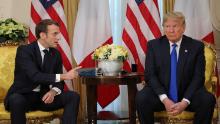
Next to Erdogan, no foreign leader initiated more calls with Trump than Macron, the sources said, with the French President often trying to convince Trump to change course on environmental and security policy matters -- including climate change and US withdrawal from the Iranian multilateral nuclear accord.
Macron usually got "nowhere" on substantive matters, while Trump became irritated at the French President's stream of requests and subjected him to self-serving harangues and lectures that were described by one source as personalized verbal "whippings," especially about France and other countries not meeting NATO spending targets, their liberal immigration policies or their trade imbalances with the US.
But his most vicious attacks, said the sources, were aimed at women heads of state. In conversations with both May and Merkel, the President demeaned and denigrated them in diatribes described as "near-sadistic" by one of the sources and confirmed by others. "Some of the things he said to Angela Merkel are just unbelievable: he called her 'stupid,' and accused her of being in the pocket of the Russians ... He's toughest [in the phone calls] with those he looks at as weaklings and weakest with the ones he ought to be tough with."
The calls "are so unusual," confirmed a German official, that special measures were taken in Berlin to ensure that their contents remained secret. The official described Trump's behavior with Merkel in the calls as "very aggressive" and said that the circle of German officials involved in monitoring Merkel's calls with Trump has shrunk: "It's just a small circle of people who are involved and the reason, the main reason, is that they are indeed problematic."
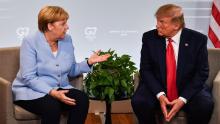
Trump's conversations with May, the UK Prime Minister from 2016 to 2019, were described as "humiliating and bullying," with Trump attacking her as "a fool" and spineless in her approach to Brexit, NATO and immigration matters.
"He'd get agitated about something with Theresa May, then he'd get nasty with her on the phone call," One source said. "It's the same interaction in every setting -- coronavirus or Brexit -- with just no filter applied."
Merkel remained calm and outwardly unruffled in the face of Trump's attacks —"like water off a duck's back," in the words of one source -- and she regularly countered his bluster with recitations of fact. The German official quoted above said that during Merkel's visit to the White House two years ago, Trump displayed "very questionable behavior" that "was quite aggressive ... [T]he Chancellor indeed stayed calm, and that's what she does on the phone."
Prime Minister May, in contrast, became "flustered and nervous" in her conversations with the President. "He clearly intimidated her and meant to," said one of CNN's sources. In response to a request for comment about Trump's behavior in calls with May, the UK's Downing Street referred CNN to its website. The site lists brief descriptions of the content of some calls and avoids any mention of tone or tension. The French embassy in Washington declined to comment, while the Russian and Turkish embassies did not respond to requests for comment.
Concerns over calls with Putin and Erdogan
The calls with Putin and Erdogan were particularly egregious in terms of Trump almost never being prepared substantively and thus leaving him susceptible to being taken advantage of in various ways, according to the sources -- in part because those conversations (as with most heads of state), were almost certainly recorded by the security services and other agencies of their countries.
In his phone exchanges with Putin, the sources reported, the President talked mostly about himself, frequently in over-the-top, self-aggrandizing terms: touting his "unprecedented" success in building the US economy; asserting in derisive language how much smarter and "stronger" he is than "the imbeciles" and "weaklings" who came before him in the presidency (especially Obama); reveling in his experience running the Miss Universe Pageant in Moscow, and obsequiously courting Putin's admiration and approval. Putin "just outplays" him, said a high-level administration official -- comparing the Russian leader to a chess grandmaster and Trump to an occasional player of checkers. While Putin "destabilizes the West," said this source, the President of the United States "sits there and thinks he can build himself up enough as a businessman and tough guy that Putin will respect him." (At times, the Putin-Trump conversations sounded like "two guys in a steam bath," a source added.)
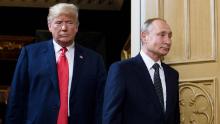
In numerous calls with Putin that were described to CNN, Trump left top national security aides and his chiefs of staff flabbergasted, less because of specific concessions he made than because of his manner -- inordinately solicitous of Putin's admiration and seemingly seeking his approval -- while usually ignoring substantive policy expertise and important matters on the standing bilateral agenda, including human rights; and an arms control agreement, which never got dealt with in a way that advanced shared Russian and American goals that both Putin and Trump professed to favor, CNN's sources said.
Throughout his presidency, Trump has touted the theme of "America First" as his north star in foreign policy, advancing the view that America's allies and adversaries have taken economic advantage of US goodwill in trade. And that America's closest allies need to increase their share of collective defense spending. He frequently justifies his seeming deference to Putin by arguing that Russia is a major world player and that it is in the United States' interest to have a constructive and friendly relationship -- requiring a reset with Moscow through his personal dialogue with Putin.
In separate interviews, two high-level administration officials familiar with most of the Trump-Putin calls said the President naively elevated Russia -- a second-rate totalitarian state with less than 4% of the world's GDP -- and its authoritarian leader almost to parity with the United States and its President by undermining the tougher, more realistic view of Russia expressed by the US Congress, American intelligence agencies and the long-standing post-war policy consensus of the US and its European allies. "He [Trump] gives away the advantage that was hard won in the Cold War," said one of the officials -- in part by "giving Putin and Russia a legitimacy they never had," the official said. "He's given Russia a lifeline -- because there is no doubt that they're a declining power ... He's playing with something he doesn't understand and he's giving them power that they would use [aggressively]."
Both officials cited Trump's decision to pull US troops out of Syria -- a move that benefited Turkey as well as Russia -- as perhaps the most grievous example. "He gave away the store," one of them said.
The frequency of the calls with Erdogan -- in which the Turkish president continually pressed Trump for policy concessions and other favors -- was especially worrisome to McMaster, Bolton and Kelly, the more so because of the ease with which Erdogan bypassed normal National Security Council protocols and procedures to reach the President, said two of the sources.
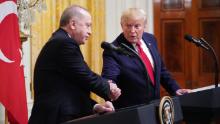
Erdogan became so adept at knowing when to reach the President directly that some White House aides became convinced that Turkey's security services in Washington were using Trump's schedule and whereabouts to provide Erdogan with information about when the President would be available for a call.
On some occasions Erdogan reached him on the golf course and Trump would delay play while the two spoke at length.
Two sources described the President as woefully uninformed about the history of the Syrian conflict and the Middle East generally, and said he was often caught off guard, and lacked sufficient knowledge to engage on equal terms in nuanced policy discussion with Erdogan. "Erdogan took him to the cleaners," said one of the sources.
The sources said that deleterious US policy decisions on Syria -- including the President's directive to pull US forces out of the country, which then allowed Turkey to attack Kurds who had helped the US fight ISIS and weakened NATO's role in the conflict -- were directly linked to Erdogan's ability to get his way with Trump on the phone calls.
Trump occasionally became angry at Erdogan -- sometimes because of demands that Turkey be granted preferential trade status, and because the Turkish leader would not release an imprisoned American evangelical pastor, Andrew Brunson, accused of 'aiding terrorism' in the 2016 coup that attempted to overthrow Erdogan. Brunson was eventually released in October 2018.
Despite the lack of advance notice for many of Erdogan's calls, full sets of contemporaneous notes from designated notetakers at the White House exist, as well as rough voice-generated computer texts of the conversations, the sources said.
According to one high-level source, there are also existing summaries and conversation-readouts of the President's discussions with Erdogan that might reinforce Bolton's allegations against Trump in the so-called "Halkbank case," involving a major Turkish bank with suspected ties to Erdogan and his family. That source said the matter was raised in more than one telephone conversation between Erdogan and Trump.
Bolton wrote in his book that in December 2018, at Erdogan's urging, Trump offered to interfere in an investigation by then-US Attorney for the Southern District of New York Geoffrey Berman into the Turkish bank, which was accused of violating US sanctions on Iran.
"Trump then told Erdogan he would take care of things, explaining that the Southern District prosecutors were not his people, but were Obama people, a problem that would be fixed when they were replaced by his people," Bolton wrote. Berman's office eventually brought an indictment against the bank in October 2019 for fraud, money laundering and other offenses related to participation in a multibillion-dollar scheme to evade the US sanctions on Iran. On June 20, Trump fired Berman -- whose office is also investigating Rudy Giuliani, the President's personal lawyer -- after the prosecutor refused to resign at Attorney General William Barr's direction.
Unlike Bolton, CNN's sources did not assert or suggest specifically that Trump's calls with Erdogan might have been grounds for impeachment because of possible evidence of unlawful conduct by the President. Rather, they characterized Trump's calls with heads of state in the aggregate as evidence of Trump's general "unfitness" for the presidency on grounds of temperament and incompetence, an assertion Bolton made as well in an interview to promote his book with ABC News last week: "I don't think he's fit for office. I don't think he has the competence to carry out the job," Bolton said.
Family feedback and grievances fuel Trump's approach
CNN spoke to sources familiar with the President's phone calls repeatedly over a four-month period. In their interviews, the sources took great care not to disclose specific national security information and classified details -- but rather described the broad contents of many of the calls, and the overall tenor and methodology of Trump's approach to his telephone discussions with foreign leaders.
In addition to rough, voice-generated software transcription, almost all of Trump's telephone conversations with Putin, Erdogan and leaders of the western alliance were supplemented and documented by extensive contemporaneous note-taking (and, often, summaries) prepared by Fiona Hill, deputy assistant to the President and senior NSC director for Europe and Russia until her resignation last year. Hill listened to most of the President's calls with Putin, Erdogan and the European leaders, according to her closed-door testimony before the House Intelligence Committee last November.
Elements of that testimony by Hill, if re-examined by Congressional investigators, might provide a detailed road-map of the President's extensively-documented conversations, the sources said. White House and intelligence officials familiar with the voice-generated transcriptions and underlying documents agreed that their contents could be devastating to the President's standing with members of the Congress of both parties -- and the public -- if revealed in great detail. (There is little doubt that Trump would invoke executive privilege to keep the conversations private. However, some former officials with detailed knowledge of many of the conversations might be willing to testify about them, sources said.)
In one of the earliest calls between Putin and Trump, the President's son-in-law Jared Kushner and Ivanka Trump were in the room to listen — joining McMaster, Tillerson, Hill, and a State Department aide to Tillerson.
"The call was all over the place," said an NSC deputy who read a detailed summary of the conversation -- with Putin speaking substantively and at length, and Trump propping himself up in short autobiographical bursts of bragging, self-congratulation and flattery toward Putin. As described to CNN, Kushner and Ivanka Trump were immediately effusive in their praise of how Trump had handled the call -- while Tillerson (who knew Putin well from his years in Russia as an oil executive), Hill and McMaster were skeptical.
Hill — author of a definitive biography of Putin -- started to explain some of the nuances she perceived from the call, according to CNN's sources — offering insight into Putin's psychology, his typical "smooth-talking" and linear approach and what the Russian leader was trying to achieve in the call. Hill was cut off by Trump, and the President continued discussing the call with Jared and Ivanka, making clear he wanted to hear the congratulatory evaluation of his daughter and her husband, rather than how Hill, Tillerson or McMaster judged the conversation.
McMaster viewed that early phone call with Putin as indicative of the conduct of the whole relationship between Russia and the Trump administration, according to the sources -- a conclusion subsequent national security advisers and chiefs of staff, and numerous high-ranking intelligence officials also reached: unlike in previous administrations, there were relatively few meaningful dealings between military and diplomatic professionals, even at the highest levels, because Trump -- distrustful of the experts and dismissive of their attempts to brief him -- conducted the relationship largely ad hoc with Putin and almost totally by himself. Ultimately, Putin and the Russians learned that "nobody has the authority to do anything" -- and the Russian leader used that insight to his advantage, as one of CNN's sources said.
The Kushners were also present for other important calls with foreign leaders and made their primacy apparent, encouraged by the President even on matters of foreign policy in which his daughter and her husband had no experience. Almost never, according to CNN's sources, would Trump read the briefing materials prepared for him by the CIA and NSC staff in advance of his calls with heads of state.
"He won't consult them, he won't even get their wisdom," said one of the sources, who cited Saudi Arabia's bin Salman as near the top of a list of leaders whom Trump "picks up and calls without anybody being prepared," a scenario that frequently confronted NSC and intelligence aides. The source added that the aides' helpless reaction "would frequently be, 'Oh my God, don't make that phone call.'"
"Trump's view is that he is a better judge of character than anyone else," said one of CNN's sources. The President consistently rejected advice from US defense, intelligence and national security principals that the Russian president be approached more firmly and with less trust. CNN's sources pointed to the most notable public example as "emblematic": Trump, standing next to the Russian President at their meeting in Helsinki, Finland, in June 2018, and saying he "didn't see any reason why" Russia would have interfered in the 2016 presidential election -- despite the findings of the entire US intelligence community that Moscow had. "President Putin was extremely strong and powerful in his denial today," Trump said.
The common, overwhelming dynamic that characterizes Trump's conversations with both authoritarian dictators and leaders of the world's greatest democracies is his consistent assertion of himself as the defining subject and subtext of the calls -- almost never the United States and its historic place and leadership in the world, according to sources intimately familiar with the calls.
In numerous calls with the leaders of the UK, France, Germany, Australia and Canada -- America's closest allies of the past 75 years, the whole postwar era -- Trump typically established a grievance almost as a default or leitmotif of the conversation, whatever the supposed agenda, according to those sources.
"Everything was always personalized, with everybody doing terrible things to rip us off — which meant ripping 'me' — Trump — off. He couldn't -- or wouldn't -- see or focus on the larger picture," said one US official.
The source cited a conspicuously demonstrable instance in which Trump resisted asking Angela Merkel (at the UK's urging) to publicly hold Russia accountable for the so-called 'Salisbury' radioactive poisonings of a former Russian spy and his daughter, in which Putin had denied any Russian involvement despite voluminous evidence to the contrary. "It took a lot of effort" to get Trump to bring up the subject, said one source. Instead of addressing Russia's responsibility for the poisonings and holding it to international account, Trump made the focus of the call -- in personally demeaning terms -- Germany's and Merkel's supposedly deadbeat approach to allied burden-sharing. Eventually, said the sources, as urged by his NSC staff, Trump at last addressed the matter of the poisonings, almost grudgingly.
"With almost every problem, all it takes [in his phone calls] is someone asking him to do something as President on behalf of the United States and he doesn't see it that way; he goes to being ripped off; he's not interested in cooperative issues or working on them together; instead he's deflecting things or pushing real issues off into a corner," said a US official.
"There was no sense of 'Team America' in the conversations," or of the United States as an historic force with certain democratic principles and leadership of the free world, said the official. "The opposite. It was like the United States had disappeared. It was always 'Just me'."
CNN's Nicole Gaouette contributed to this report.

 5 years ago
721
5 years ago
721 




